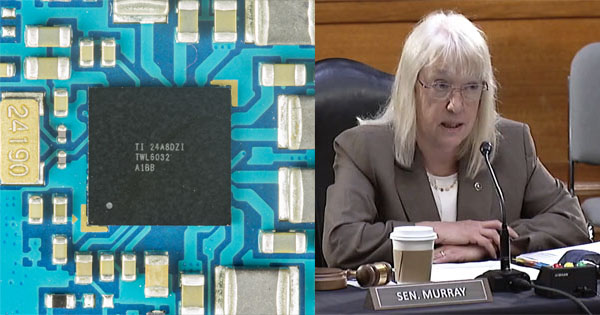NATIONAL
Murray, unions hail passage of CHIPS Act
UPDATE (July 28, 2022) — The U.S. House of Representatives on Thursday passed the CHIPS and Science Act on a 243-187 vote, and it now advances to President Biden’s desk for signature into law. Washington’s congressional delegation split along party lines with all Democrats voting “yes” and all Republicans voting “no.”
AFL-CIO President Liz Shuler said today, “Through major investments like the CHIPS Act, we can keep building a resilient and robust economy that will support working people and put us on the path to long-term success.”
WASHINGTON, D.C. (July 28, 2022) — U.S. Senator Patty Murray (D-WA), AFL-CIO President Liz Shuler, and multiple other union leaders hailed Wednesday’s 64-33 Senate vote to approve the CHIPS and Science Act as necessary to strengthen supply chains, invest in American manufacturing and Washington state jobs, and to lower the costs of everyday goods that rely on semiconductor chips. The legislation will invest in American manufacturing — especially in Washington state, which ranks among the top 10 states in terms of its semiconductor manufacturing workforce — by allowing small- and medium-sized microchip manufacturers to expand and hire more workers, get products on the shelves faster, and lower costs on consumer electronics.

“Passing the CHIPS and Science Act will strengthen our supply chains, invest in American manufacturing and jobs here in Washington state, and lower the cost of everyday goods that we all rely on,” Murray said after Wednesday’s Senate passage of the legislation. “This legislation sends a clear message that we are making things in America again and that we will continue to lead the world in manufacturing while creating good-paying jobs here at home. I’m focused on real solutions, not soundbites—this is one important way we can tackle major challenges Washington state families are facing like inflation.”
 Sen. Maria Cantwell also hailed the measure’s passage on Wednesday.
Sen. Maria Cantwell also hailed the measure’s passage on Wednesday.
“We know that innovation is in the DNA of Americans. We know it’s helped us win the world wars, it’s helped us cure disease, it’s helped create millions of jobs,” said Cantwell, who led Democratic negotiations for the nearly $250 billion package of investments in American science and technology research. “We don’t know exactly what innovations will come out of this, but we do know this: America will be more competitive because of it. And we do know this, that we will be able to grow our economy for the future, because of the investments that we’ve made today.”
Union leaders also expressed their strong support of the historic legislation. On Wednesday, AFL-CIO President Liz Shuler released this statement:
Today’s passage of the bipartisan CHIPS Act in the Senate is a critical step toward rectifying years of underinvestment in our nation’s manufacturing and research and development capabilities. This legislation will boost America’s domestic supply chains, create thousands of high-paying jobs, strengthen our technology infrastructure, increase national security and promote vital research to ensure that we remain a global leader in innovation.
The billions of dollars in funding allocated for the semiconductor industry will expand our ability to develop more chips and incentivize companies to ramp up production nationwide. We also welcome the stipulations in the bill that hold companies accountable for how they utilize taxpayer dollars; facilitate the growth of a well-trained, highly skilled workforce; and create opportunities for historically disadvantaged communities to participate in CHIPS Act–funded projects and training programs.
We will continue to advocate for many of the important trade-related provisions that were not included in this version of the bill and would have done more to protect working people. Provisions such as the Trade Adjustment Assistance (TAA) Program—which expired in July—would have given workers who have lost their jobs to offshoring the opportunity to gain skills suited for newly built semiconductor facilities. Reinforcing U.S. labor laws and deterring China’s harmful trade practices are top priorities for our movement, and we won’t stop fighting until these necessary measures and reforms are in place. Working people deserve a voice and a seat at the table in every step of the process, and when we have one, we will build a more competitive America.
Other unions, particularly those in the manufacturing sector, echoed Shuler’s support of the CHIPS Act.
“The CHIPS Act for America is good for workers, our national security, and economy,” said UAW President Chris Shelton. “It would improve U.S. manufacturing competitiveness and help ensure we do not have future shortages that sideline the sales of cars, trucks, agricultural and construction equipment, many of which are built by UAW members.”
While supporting its passage, organized labor also expressed disappointment that the reauthorization of the Trade Adjustment Assistance (TAA) program, which was included in a previous House version of the bill, was not part of the Senate-approved CHIPS Act. The program, which provides extended unemployment and training benefits to workers whose jobs are outsourced overseas, expired July 1 amid Republican opposition.
“We had hoped the Senate would incorporate a reauthorization of Trade Adjustment Assistance (TAA) and several other pro-worker provisions from House-passed COMPETES Act and encourage the Senate take action to pass these provisions this year,” said UAW President Ray Curry.





